-
ORIGINAL ARTICLE12-04-2023
30-Year High Cardiovascular Risk Incidence and its Determinants: CUME Study
Revista Brasileira de Enfermagem. 2023;76(6):e20220544
Abstract
ORIGINAL ARTICLE30-Year High Cardiovascular Risk Incidence and its Determinants: CUME Study
Revista Brasileira de Enfermagem. 2023;76(6):e20220544
DOI 10.1590/0034-7167-2022-0544
Views0See moreABSTRACT
Objective:
Estimate the incidence of the 30-year high cardiovascular risk and its determinants among graduates of federal universities in Minas Gerais.
Methods:
This is a prospective cohort of 2,854 adults aged 20 to 59. The incidence of the outcome was calculated using the Framingham equation and its determinants were determined through multivariate Cox regression.
Results:
After an average of 2.62 years, the incidence of high cardiovascular risk was 8.09 and 20.1 cases per 1,000 person-years, for females and males respectively. Being male (HR: 2.34; 95% CI: 1.58 – 3.46), employment (HR: 2.13; 95% CI: 1.13 – 3.99), high consumption of processed foods (HR: 2.44; 95% CI: 1.21 – 4.90), and being physically active (HR: 0.63; 95% CI: 0.41 – 0.98) were associated with high cardiovascular risk.
Conclusions:
Among highly educated adults, being male, employment, and high consumption of processed foods are predictors of high cardiovascular risk, while being physically active acts as a protective factor.
-
ORIGINAL ARTICLE12-04-2023
“Fala-M@no-COVID-19”: technological development of a health navigation program for men during the pandemic
Revista Brasileira de Enfermagem. 2023;76(6):e20220534
Abstract
ORIGINAL ARTICLE“Fala-M@no-COVID-19”: technological development of a health navigation program for men during the pandemic
Revista Brasileira de Enfermagem. 2023;76(6):e20220534
DOI 10.1590/0034-7167-2022-0534
Views0See moreABSTRACT
Objective:
to develop a care-educational technology similar to a health navigation program for men during the COVID-19 pandemic.
Methods:
a methodological and qualitative study of a care-educational technology of health navigation program, structured by Program Development Cycle, with 16 patient navigators and 10 professional navigators. It used reflective thematic content analysis and an adaptation model for data processing.
Results:
the ; navigation program was developed by: I) Observation of reality, problem mapping, needs assessment: content selection, creation of domains and questions; II) Theoretical-conceptual and methodological definition, creation of product under the elaboration of care plans, based on theory, process and taxonomies by a flowchart of operationalization of actions; and III) Self-assessment: qualitative research with professional navigators.
Final considerations:
the technology developed, with theoretical and methodological support, allowed to derive a viable navigation program compatible with reality based on the audience’s needs.
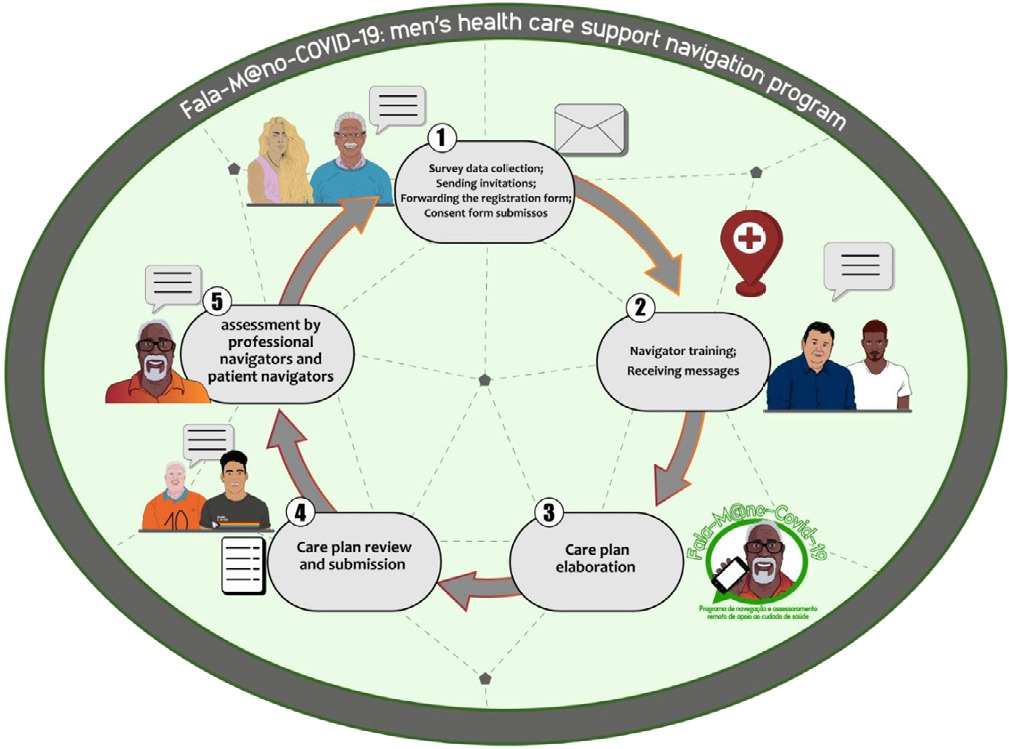
-
ORIGINAL ARTICLE12-04-2023
Social representation of young people in higher education about sexually transmitted infections
Revista Brasileira de Enfermagem. 2023;76(6):e20220406
Abstract
ORIGINAL ARTICLESocial representation of young people in higher education about sexually transmitted infections
Revista Brasileira de Enfermagem. 2023;76(6):e20220406
DOI 10.1590/0034-7167-2022-0406
Views0See moreABSTRACT
Objective:
to analyze the social representations about sexually transmitted infections elaborated by undergraduate students.
Methods:
a descriptive, qualitative study, in the light of the structural approach of Social Representation Theory, carried out with 160 young undergraduate students, in the second half of 2019, in the city of Rio de Janeiro. Data were collected using a sociodemographic characterization questionnaire, knowledge and practices for preventing sexually transmitted infections, analyzed using descriptive statistics and a form of free evocations with the inducing term STD, analyzed using prototypical and similarity analysis.
Results:
the representation’s possible central nucleus is composed of lexicons aids, disease and HIV; the peripheral system by syphilis, sex, condoms, gonorrhea, prevention, infection, carelessness, HPV, herpes, ignorance, treatment, fear, unprotected-sex and danger.
Final considerations:
social thinking about sexually transmitted infections is characterized by their recognition as diseases, which require barrier prevention measures, associating with unsafe sexual practices that arouse fear.

-
12-04-2023
The Medical Healing of Souls: a strategy for welcoming post-pandemic mental health
Revista Brasileira de Enfermagem. 2023;76(6):e20220331
Abstract
The Medical Healing of Souls: a strategy for welcoming post-pandemic mental health
Revista Brasileira de Enfermagem. 2023;76(6):e20220331
DOI 10.1590/0034-7167-2022-0331
Views0See moreABSTRACT
Objective:
to reflect on the applicability of the Medical Healing of Souls (MHS) by health professionals as a welcoming strategy in post-pandemic mental health.
Methods:
a theoretical and reflective study, based on Viktor Frankl’s philosophy, based on the book “The Doctor and the Soul, From Psychotherapy to Logotherapy” and scientific literature.
Results:
the study was structured in two discursive approaches: MHS in the field of health; The applicability of MHS in post-pandemic mental health care.
Final considerations:
MHS can be used in mental health care, in health emergencies, promoting a more humane performance of health professionals, facilitating the integration of inevitable suffering into a meaningful life.
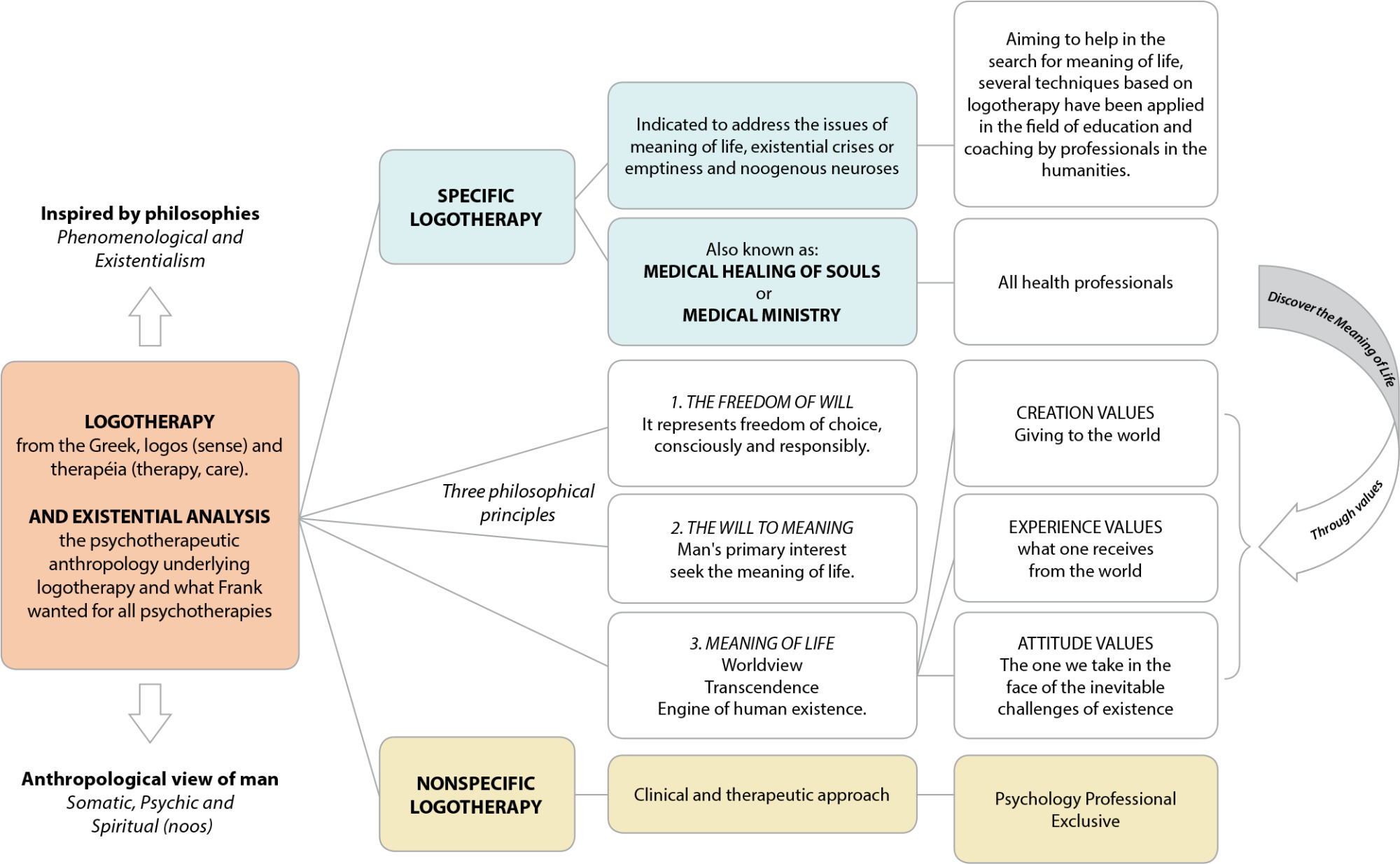
-
ORIGINAL ARTICLE12-04-2023
Translation, cross-cultural adaptation and validity study of the “Play Nicely Program: The Healthy Discipline Handbook” for use in Brazil
Revista Brasileira de Enfermagem. 2023;76(6):e20220281
Abstract
ORIGINAL ARTICLETranslation, cross-cultural adaptation and validity study of the “Play Nicely Program: The Healthy Discipline Handbook” for use in Brazil
Revista Brasileira de Enfermagem. 2023;76(6):e20220281
DOI 10.1590/0034-7167-2022-0281
Views0See moreABSTRACT
Objective:
to describe the translation, cross-cultural adaptation and validity process of the “Play Nicely Program: The Healthy Discipline Handbook” for use in Brazil.
Methods:
a methodological study that followed the translation, back-translation, expert committee assessment, and pre-test steps. The Content Validity Index (CVI) was calculated for both the judge population and the pre-test population. Four translators, seven expert judges in the field of child health and thirty participants in the pre-test, including parents, teachers and healthcare professionals, participated in the study.
Results:
in experts’ analysis (98.4%), a value of 100% of adequate assessments was obtained, and in the target population’s analysis (89.5%), there were 100% of adequate assessments. In both analyses, suggested adaptations were made.
Conclusios:
cross-cultural adaptation and content validity into Brazilian Portuguese of the “Play Nicely Program: The Healthy Discipline Handbook” were considered adequate for application in the target population.

-
ORIGINAL ARTICLE12-04-2023
Emergency units and COVID-19: Burnout, and empathy reported by nursing professionals and perceived by patients
Revista Brasileira de Enfermagem. 2023;76(6):e20210869
Abstract
ORIGINAL ARTICLEEmergency units and COVID-19: Burnout, and empathy reported by nursing professionals and perceived by patients
Revista Brasileira de Enfermagem. 2023;76(6):e20210869
DOI 10.1590/0034-7167-2021-0869
Views0See moreABSTRACT
Objective:
To investigate Burnout Syndrome and empathy self-reported by the nursing staff and empathy perceived by the patient.
Method:
Cross-sectional study in a public emergency unit in São Paulo (from October/2020 to March/2021). The nursing staff answered the Maslach Burnout Inventory and the Consultation and Relational Empathy Measure-Nurses (Brazilian version), whereas adult patients answered the Consultation and Relational Empathy Measure (Brazilian version). Descriptive and inferential analysis, with a 5% significance level.
Results:
A total of 92 professionals and 271 patients participated. Most professionals reported impact of COVID-19 (80; 86.96%) and, among them, increased Burnout Syndrome (93; 75%), but with low emotional exhaustion (71; 74%), low depersonalization (59; 78%) and high level of professional accomplishment (72; 83%). Most reported impact and increased empathy, and the results reported by professionals and patients (mean and standard deviation) were: 39.89 (6.44) and 38.25 (9.45), respectively.
Conclusion:
The professionals reported a low level of Burnout Syndrome and a high level of empathy in pandemic.
-
ERRATUM11-27-2023
ERRATUM
Revista Brasileira de Enfermagem. 2023;76(5):e2023n5e05
Abstract
ERRATUMERRATUM
Revista Brasileira de Enfermagem. 2023;76(5):e2023n5e05
DOI 10.1590/0034-7167.20237605e05
Views0In the article “Performance of Family Health Strategy Nurses in LGBT+ Healthcare”, with DOI number: , published in Revista Brasileira de Enfermagem, 2023;76(4): e20220514, authored:Where it read:[…]See more -
ORIGINAL ARTICLE11-27-2023
Mental suffering in family daily life: a temporal journey according to Merleau-Ponty
Revista Brasileira de Enfermagem. 2023;76(5):e20230258
Abstract
ORIGINAL ARTICLEMental suffering in family daily life: a temporal journey according to Merleau-Ponty
Revista Brasileira de Enfermagem. 2023;76(5):e20230258
DOI 10.1590/0034-7167-2023-0258
Views0See moreABSTRACT
Objectives:
to describe the family’s experience in relation to daily life with a family member experiencing mental suffering.
Methods:
a qualitative, descriptive, phenomenological study grounded in Merleau-Ponty’s ontology of experience was conducted in ten households in a city in the state of Bahia, Brazil, where 24 participants of the Intersubjectivity Wheels reside. The descriptions produced were subjected to the Ambiguity Analytics technique.
Results:
the descriptions were categorized into: absence as a creative power of the sense of “being” and “not being a family”; and exclusion and acceptance as expressions of mental suffering in the family context.
Final Considerations:
the experience of mental suffering in the family’s daily life is marked by ambiguous feelings, such as joy and sadness, disappointment and satisfaction, lack of love and love. However, experiencing these feelings can mobilize the desire to “become” a family, increase the sense of autonomy and independence, and drive the formation of new family configurations.
-
01-01-2015
Health technologies for spatial analysis and situational diagnosis of the territories: contributions to nursing
Revista Brasileira de Enfermagem. 2015;68(6):999-1000
Abstract
Health technologies for spatial analysis and situational diagnosis of the territories: contributions to nursing
Revista Brasileira de Enfermagem. 2015;68(6):999-1000
DOI 10.1590/0034-7167.2015680601i
Views0In order to establish an organizational basis for work processes in primary health care geared towards a new social practice, it is important to recognize territories and their contexts, as these materialize human interactions, conflicts, health problems and human needs.In the process of recognition and situational diagnosis of territories, technologies for spatial analysis can facilitate […]See more -
01-01-2015
Tecnologias em saúde para análise espacial e diagnóstico situacional dos territórios: contribuições para a enfermagem
Revista Brasileira de Enfermagem. 2015;68(6):999-1000
Abstract
Tecnologias em saúde para análise espacial e diagnóstico situacional dos territórios: contribuições para a enfermagem
Revista Brasileira de Enfermagem. 2015;68(6):999-1000
DOI 10.1590/0034-7167.2015680601i
Views0Para a constituição de uma base organizativa dos processos de trabalho na Atenção Primária à Saúde em direção a uma nova prática social é importante o reconhecimento dos territórios e seus contextos, pois estes materializam as interações humanas, os conflitos, os problemas de saúde e necessidades humanas.Nesse processo de reconhecimento e diagnóstico situacional dos territórios, […]See more -
01-01-2015
CARTA DE FORTALEZA PARA A ENFERMAGEM BRASILEIRA
Revista Brasileira de Enfermagem. 2015;68(5):961-962
Abstract
CARTA DE FORTALEZA PARA A ENFERMAGEM BRASILEIRA
Revista Brasileira de Enfermagem. 2015;68(5):961-962
DOI 10.1590/0034-7167.2015680527
Views0APRESENTAÇÃOOs participantes do 18º Seminário Nacional de Pesquisa em Enfermagem (SENPE), promovido pela Associação Brasileira de Enfermagem (ABEn) e realizado pela ABEn Seção Ceará, aprovaram, em Sessão Plenária de Encerramento, no dia 03 de junho de 2015, a “Carta de Fortaleza para a Enfermagem Brasileira”. A ABEn vem a público divulgá-la, ao mesmo tempo em […]See more -
01-01-2015
Delayed surgical recovery: a concept analysis
Revista Brasileira de Enfermagem. 2015;68(5):953-960
Abstract
Delayed surgical recovery: a concept analysis
Revista Brasileira de Enfermagem. 2015;68(5):953-960
DOI 10.1590/0034-7167.2015680526i
Views0See moreABSTRACT
Objective:
analyze the concept of delayed surgical recovery.
Method:
the Rodgers’ concept analysis provided the procedural mechanisms to guide the study, and an integrative review was performed to achieve the second activity of the model adopted. The PubMed, CINAHL, EMBASE and LILACS databases were selected to search for primary studies.
Results:
sixty-six primary studies were included and served as basis to construct the use and meaning of delayed surgical recovery concept. In the analysis, six attributes were outlined, which are interrelated and underpin the research concept definition. Preliminary experience was identified as the antecedent. The consequences of the concept are expressed through clinical manifestations, re-interventions, dependence on care and reduced quality of life.
Conclusion:
the definition of the concept was constructed, and the antecedents and consequents were identified. The use and meaning of the delayed surgical recovery concept point to the use of the qualifier ‘impaired’ instead of ‘delayed’.
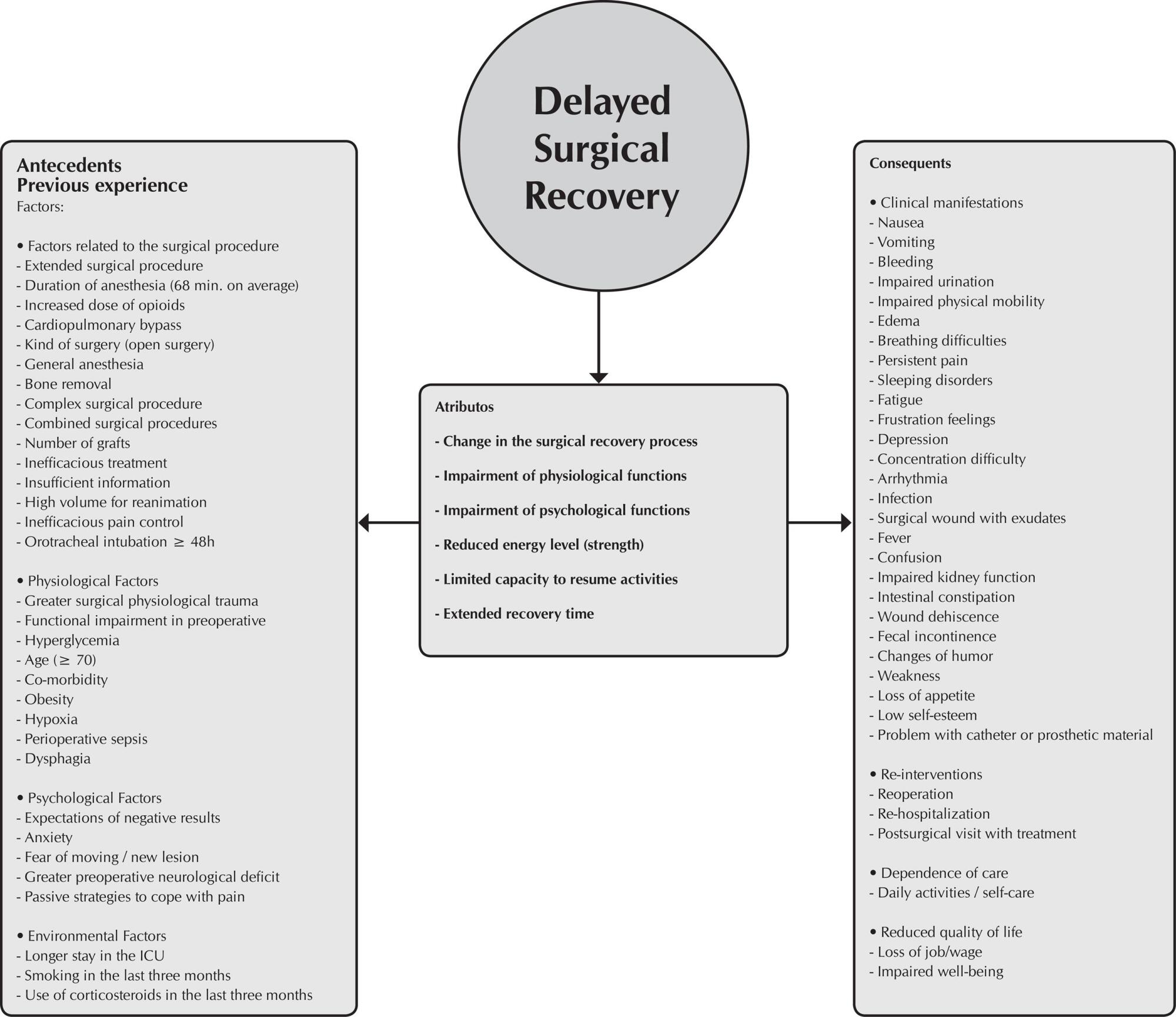
-
01-01-2015
Total Quality Management and hospital nursing: an integrative literature review
Revista Brasileira de Enfermagem. 2015;68(5):945-952
Abstract
Total Quality Management and hospital nursing: an integrative literature review
Revista Brasileira de Enfermagem. 2015;68(5):945-952
DOI 10.1590/0034-7167.2015680525i
Views0See moreABSTRACT
Objective:
to identify the available evidence in the literature on Total Quality Management in nursing administration.
Method:
integrative literature review of full text articles in Portuguese, English and Spanish, published between 2000 and 2011 in the LILACS, MEDLINE, SciELO and PubMed databases.
Results:
the sample comprises 24 periodical articles grouped by the following thematic categories: Theoretical assumptions; Practical application and Quality indicators. Despite the criticism of models derived from classic administration theories, experiences of success with the deployment of TQM have already marked the health and nursing setting in Brazil.
Conclusion:
Total Quality Management in managing of nursing care has being fully used in some health institutions, while others have adopted several of its principles. Two of the twenty four articles are intervention studies, which characterizes the necessity for clinical research in this area.
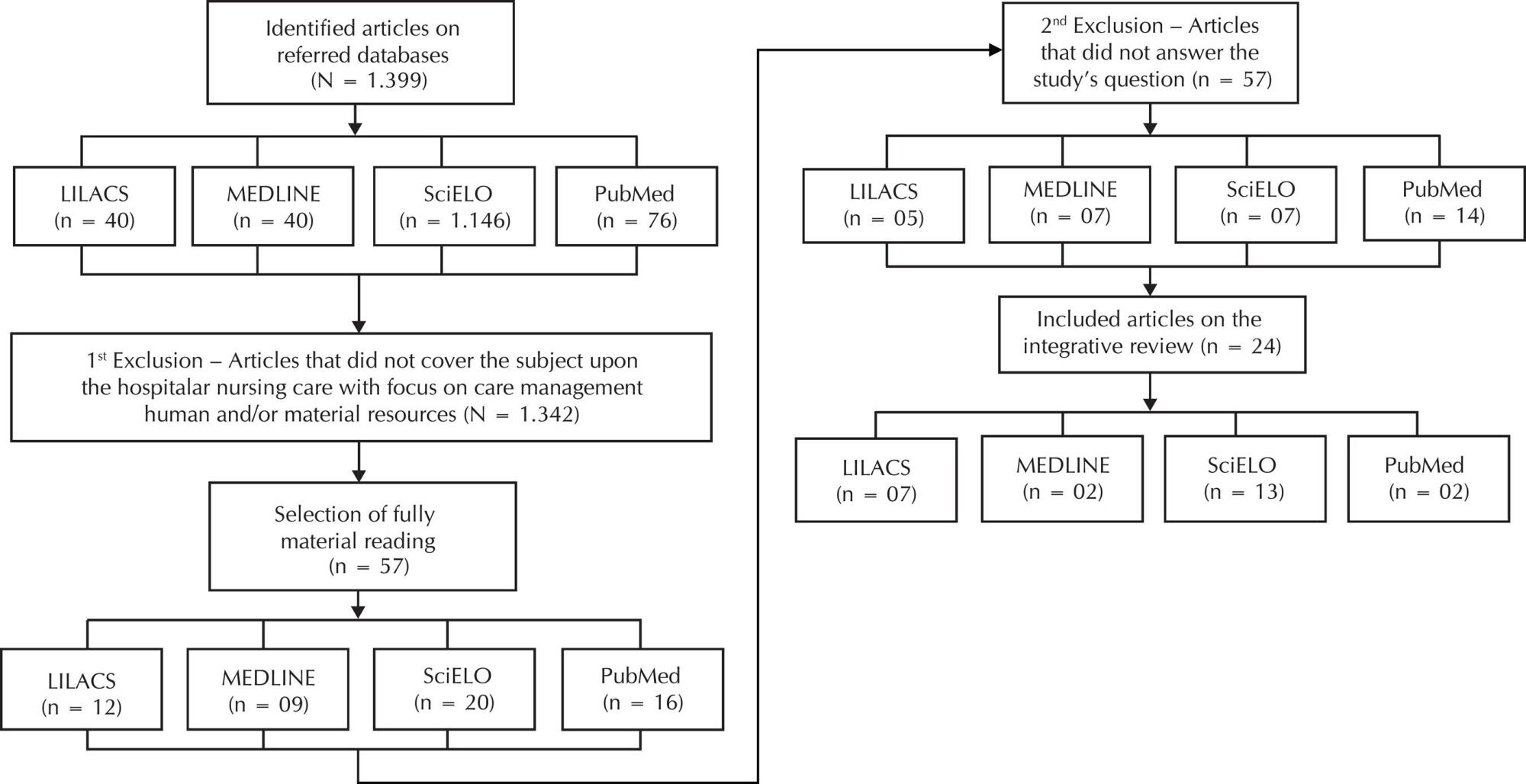
-
01-01-2015
Association between fatigue and functional capacity in patients with intermittent claudication
Revista Brasileira de Enfermagem. 2015;68(5):937-944
Abstract
Association between fatigue and functional capacity in patients with intermittent claudication
Revista Brasileira de Enfermagem. 2015;68(5):937-944
DOI 10.1590/0034-7167.2015680524i
Views0See moreABSTRACT
Objective:
to characterize fatigue and exertion fatigue in patients with intermittent claudication (IC), and to test their association with sociodemographic and clinical variables, walking capacity and level of physical activity.
Method:
forty-nine participants (66.6 years; 70% male) were studied. Validated questionnaires were used to assess fatigue (DUFS), exertion fatigue (DEFS), level of physical activity (BASIC) and walking capacity (WIQ).
Results:
participants had substantial fatigue (DUFS = 20.4+8.8) and substantial exertion fatigue (DEFS = 20.4+10.8). There was an association between the DUFS and marital status (p = 0,008). There was a statically significant association between DEFS with scores of the BASIC (r = .331; p = .02) and among DEFS with WIQ domains – walking distance (r=.359; p = .011) and climbing stairs (r=.331; p = .02).
Conclusion:
patients with IC have fatigue and exertion fatigue. Exertion fatigue might compromise the engagement of these patients in physical activity, one of the main components of IC treatment.
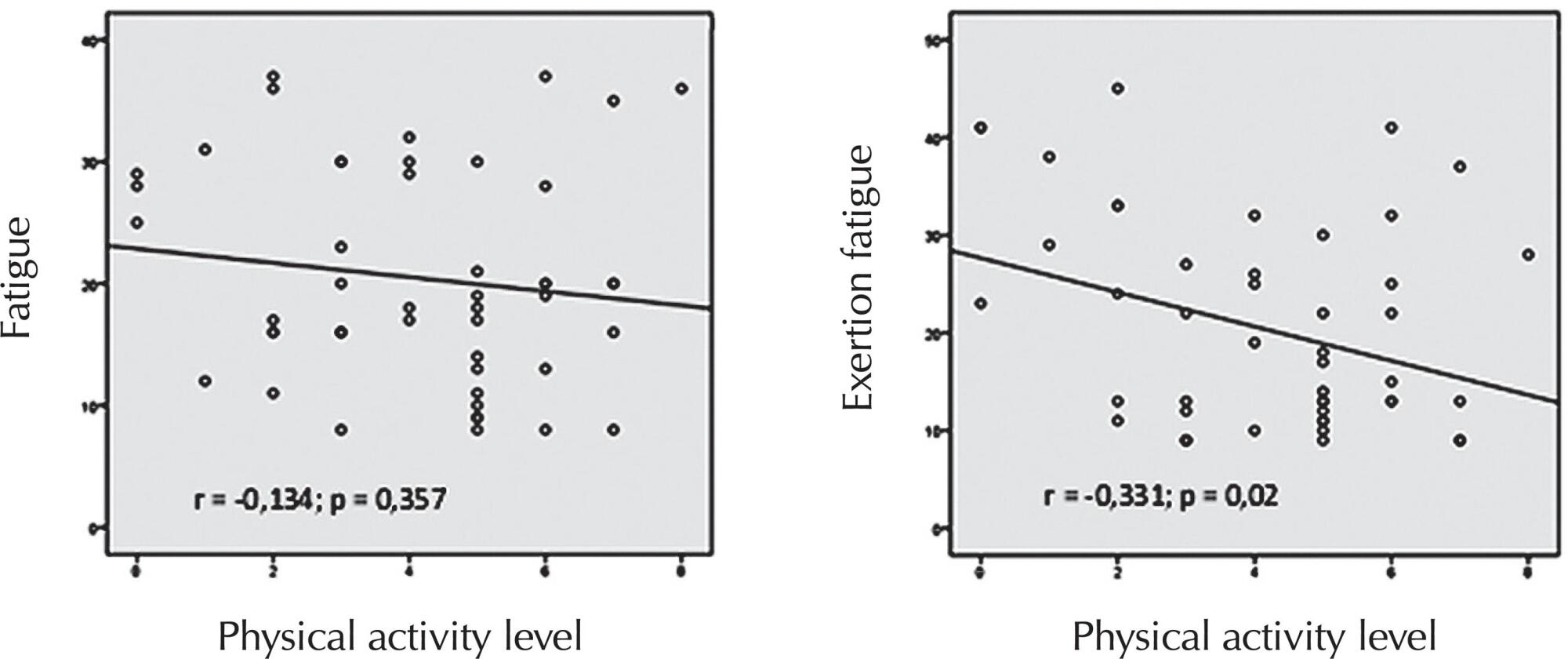
-
01-01-2015
Body mobilization for prevention of pressure ulcers: direct labor costs
Revista Brasileira de Enfermagem. 2015;68(5):930-936
Abstract
Body mobilization for prevention of pressure ulcers: direct labor costs
Revista Brasileira de Enfermagem. 2015;68(5):930-936
DOI 10.1590/0034-7167.2015680523i
Views0See moreABSTRACT
Objective:
to calculate the average total cost (ATC) on the direct labor costs (DLC) of nursing professionals in body mobilization of patients for the prevention of pressure ulcers.
Method:
this is a quantitative, exploratory and, descriptive research. We observed 656 preventive mobilizations and we calculated the cost by multiplying the time spent by professionals at a unitary DLC.
Results:
ATC with DLC for each Unit corresponded to: Medical Clinic R$ 5.38 for bed turning, R$ 5.26 for seating positions, R$ 5.55 for walking aid; Surgical Clinic R$ 2.42 for bed turning, R$ 2.30 for seating positions, R$ 2.96 for walking aid and Intensive Care Unit R$ 8.15 for bed turning, R$ 7.57 for seating positions, R$ 15.32 for walking aid.
Conclusion:
the knowledge generated can support management related to costs of human resources needed to efficiently and effectively nursing care.
-
01-01-2015
The mobilization of nurses for the non-interruption of nursing residence
Revista Brasileira de Enfermagem. 2015;68(5):923-929
Abstract
The mobilization of nurses for the non-interruption of nursing residence
Revista Brasileira de Enfermagem. 2015;68(5):923-929
DOI 10.1590/0034-7167.2015680522i
Views0See moreABSTRACT
Objective:
To analyze the strategies employed by nurses to maintain the nursing residence program at the Ophir Loyola Hospital and discuss the potential effects of this interruption on the state of Pará.
Method:
Social-historic research. Data were collected through primary sources, written documents, and oral testimonial; the secondary sources used were manuals and articles that approached the topic in question. The theoretical reference was based on the French sociologist Pierre Bourdieu’s ideas about the concepts of cultural, social, and symbolic capital, in addition to the habitus and field concepts.
Results:
During the nurses’ mobilization there was a strong political influence on the development of the crisis and the interruption of the nursing residence Program at the Ophir Loyola Hospital, with implications for the nurses’ qualifications and the health care delivered to the societyof Pará.
Conclusion:
The analysis showed the prevalence of partisan political interests at the expense of social interests, culminating in the interruption of the nursing residency.
-
01-01-2016
ERRATUM
Revista Brasileira de Enfermagem. 2016;69(1):206-206
Abstract
ERRATUM
Revista Brasileira de Enfermagem. 2016;69(1):206-206
DOI 10.1590/0034-7167.20166901e02
Views0In the article “Conceptions of mid-level nursing professionals facing those with a chemical dependency”, with the number of DOI: 10.1590/0034-7167.2015680610i, published in the journal Revista Brasileira de Enfermagem, v68(6):755-60, page 760 that read:“8. Vargas D, Soares J. Knowledge and attitudes of nurses towards alcohol and related problems: the impact of an educational intervention. Rev Esc […]See more -
01-01-2016
ERRATUM
Revista Brasileira de Enfermagem. 2016;69(1):205-205
Abstract
ERRATUM
Revista Brasileira de Enfermagem. 2016;69(1):205-205
DOI 10.1590/0034-7167.20166901e01
Views0In the article “Using the theory of meaningful learning in nursing education”, with the number of DOI: 10.1590/0034-7167.2015680420i, published in the journal Revista Brasileira de Enfermagem, v68(4):626-35, page 627 that read:“Ausubel was descended from Jewish, born in New York in 1918 and died in 1994 at the age of 75. He thought and wrote until […]See more -
01-01-2016
Nursing process documentation: rationale and methods of analytical study
Revista Brasileira de Enfermagem. 2016;69(1):197-204
Abstract
Nursing process documentation: rationale and methods of analytical study
Revista Brasileira de Enfermagem. 2016;69(1):197-204
DOI 10.1590/0034-7167.2016690126i
Views0See moreABSTRACT
Objective:
to describe the methods used to analyze the associations between variables of service, nursing and the nursing process documentation in institutions of the Department of Health of the State of São Paulo.
Method:
multilevel analytical study with data obtained in the domains of institution, units of the institution and nursing professionals who work there, using standardized instruments. The analyses had as axis the degree of completeness of the nursing process documentation in units or institutions and their association with variables of nursing personnel, of units and of institutions.
Conclusion:
This study will provide important empirical evidence on the factors involved in the nursing process documentation.
-
01-01-2016
Qualitative methodologies in health research: interpretive referential of Patricia Benner
Revista Brasileira de Enfermagem. 2016;69(1):192-196
Abstract
Qualitative methodologies in health research: interpretive referential of Patricia Benner
Revista Brasileira de Enfermagem. 2016;69(1):192-196
DOI 10.1590/0034-7167.2016690125i
Views0See moreABSTRACT
Objective:
this article reports on the experience of using the interpretive phenomenological framework of Patricia Benner in a Brazilian context. Benner’s interpretive phenomenology, based on existential and interpretative philosophy, aims to understand human experiences in the particular worlds of research participants. Data were collected through interviews with nine nurses in November and December 2014.
Results:
data analysis process according to Benner’s framework consisted of: transcription, coding, thematic analysis, and search for paradigmatic cases and examples. Therefore, the prior knowledge of the researcher is an important part of the study, consisting in manners of the research conduction.
Conclusion:
The use of this methodological framework entailed a great challenge for the researcher, however, it also enabled a unique opportunity to illuminate important existential phenomena related to the daily lives of research participants.
-
01-01-2016
Nurses’ performance on primary care in the National Health Service in England
Revista Brasileira de Enfermagem. 2016;69(1):182-191
Abstract
Nurses’ performance on primary care in the National Health Service in England
Revista Brasileira de Enfermagem. 2016;69(1):182-191
DOI 10.1590/0034-7167.2016690124i
Views0See moreABSTRACT
Objective:
To analyze the expansion of nursing roles in primary care in the English National Health Service and the implications for professional practice.
Method:
qualitative research in case study format, held in London, England, in six primary care units. Data were obtained through interviews with nine nurses. After the thematic data analysis, two units emerged: the nurses’ performance characteristics and effects of the expansion of nursing roles.
Results:
expansion of nurses’ roles: consultation, diagnosis and drug therapy, case management and monitoring of chronic conditions. Repercussions: for the user, there was improved access, communication and comprehensive care, increased duration of consultations, resulting in greater adherence; for nurses, there was the expansion of professional skills, knowledge and professional recognition; to the health care system, it resulted in cost savings.
Conclusion:
benefits in expanding nursing roles, were visible, contributing to primary care quality.
-
01-01-2016
Meleis’ Nursing Theories Evaluation: integrative review
Revista Brasileira de Enfermagem. 2016;69(1):174-181
Abstract
Meleis’ Nursing Theories Evaluation: integrative review
Revista Brasileira de Enfermagem. 2016;69(1):174-181
DOI 10.1590/0034-7167.2016690123i
Views0See moreABSTRACT
Objective:
to analyze the application of the theory evaluation model proposed by Meleis in Brazilian studies.
Method:
integrative review of online articles published from 2002 to 2012 in the databases LILACS and BDENF.
Results:
the 16 selected studies confirmed the use of only three of the five stages proposed for Meleis’ theories analysis: Description of the Theory, Criticism of the Theory and Analysis of the Theory, with a predominance of a single unit of analysis in each.
Conclusion:
the analysis of nursing theories provides support to nurses in the practice, research, education and administration of the different dimensions of care. Meleis’ model figures as very important by contributing to the development of knowledge of nursing discipline, considering that its use as a method allows several reflections on theories in order that they be revalidated to support a more theoretical and practical applicability.

-
01-01-2016
Clinical indicators of sexual dysfunction in pregnant women: integrative literature review
Revista Brasileira de Enfermagem. 2016;69(1):165-173
Abstract
Clinical indicators of sexual dysfunction in pregnant women: integrative literature review
Revista Brasileira de Enfermagem. 2016;69(1):165-173
DOI 10.1590/0034-7167.2016690122i
Views0See moreABSTRACT
Objective:
to identify the nursing diagnosis clinical indicators of sexual dysfunction in pregnant women.
Method:
it is an integrative literature review, with research in databases using the keywords “sexual*”, “pregnan*” and “function*”. Studies included had an abstract available for analysis, referring to pregnant women over 18 years old, written in Portuguese, French, Spanish and English, with publication date between 2010 and 2014. Studies that reporting pregnant women with an associated pathology were excluded.
Results:
sexual dysfunction in pregnant women is consistent in the literature. Nine defining characteristics were identified and 16 related factors, some not classified in NANDA International.
Conclusion:
clinical indicators can be added to the nursing diagnosis to favor an accurate diagnosis and effective interventions in the surveillance of pregnancy as a period of healthy sexual experience.

-
01-01-2016
Conditions of functional health literacy of an elderly diabetics group
Revista Brasileira de Enfermagem. 2016;69(1):156-164
Abstract
Conditions of functional health literacy of an elderly diabetics group
Revista Brasileira de Enfermagem. 2016;69(1):156-164
DOI 10.1590/0034-7167.2016690121i
Views0See moreABSTRACT
Objective:
to evaluate the conditions of functional health literacy of an elderly diabetics group.
Method:
cross-sectional and descriptive study, with diabetic’s elderly assisted in the SUS (N = 114). The social and health conditions were evaluated as well as functional health literacy by S-TOFHLA test (short version); the simple proportions, average, standard deviation and Pearson’s Chi-square were described by SPSS software (20.0) with α = 5% value.
Results:
the mean age was 67.4 years, 74.0% of the elderly were women, had up to four years of schooling; 29.8% had a long-standing illness, 64.0% reported having high blood pressure, 47.4% smoke or were smokers, 73.7% had low functional health literacy, which was associated with schooling p = 0.001.
Conclusions:
the low functional health literacy could be a self-care conditioning and can be influenced by low schooling because it implies to have skills to understand and make decisions aimed at self-management of health.
Search
Search in:
Nuvem de Tags
Adolescente (85) Atenção Primária à Saúde (239) COVID-19 (91) Criança (91) Cuidados de Enfermagem (269) Educação em Enfermagem (151) Educação em Saúde (139) Enfermagem (930) Enfermagem Pediátrica (86) Estudantes de Enfermagem (77) Estudos de Validação (131) Família (87) Idoso (208) Promoção da Saúde (99) Qualidade de Vida (104) Saúde do Trabalhador (86) Saúde Mental (145) Saúde Pública (82) Segurança do Paciente (150) Tecnologia Educacional (100)



